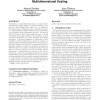1032 search results - page 109 / 207 » A Category of Explicit Fusions |
GECCO
2007
Springer
14 years 2 months ago
2007
Springer
In many design tasks it is difficult to explicitly define an objective function. This paper uses machine learning to derive an objective in a feature space based on selected examp...
GECCO
2007
Springer
14 years 2 months ago
2007
Springer
Visualization of multidimensional data by means of Multidimensional Scaling (MDS) is a popular technique of exploratory data analysis widely usable, e.g. in analysis of bio-medica...
GECCO
2007
Springer
14 years 2 months ago
2007
Springer
In this paper we propose a genetic programming approach to learning stochastic models with unsymmetrical noise distributions. Most learning algorithms try to learn from noisy data...
GECCO
2007
Springer
14 years 2 months ago
2007
Springer
In this paper, we introduce a formal-language model for explicitly formalizing agent-environment interaction in a multiagent systems (MAS) framework: Conversational Grammar System...
GECCO
2007
Springer
14 years 2 months ago
2007
Springer
The focus of this paper is on how to design evolutionary algorithms (EAs) for solving stochastic dynamic optimization problems online, i.e. as time goes by. For a proper design, t...



